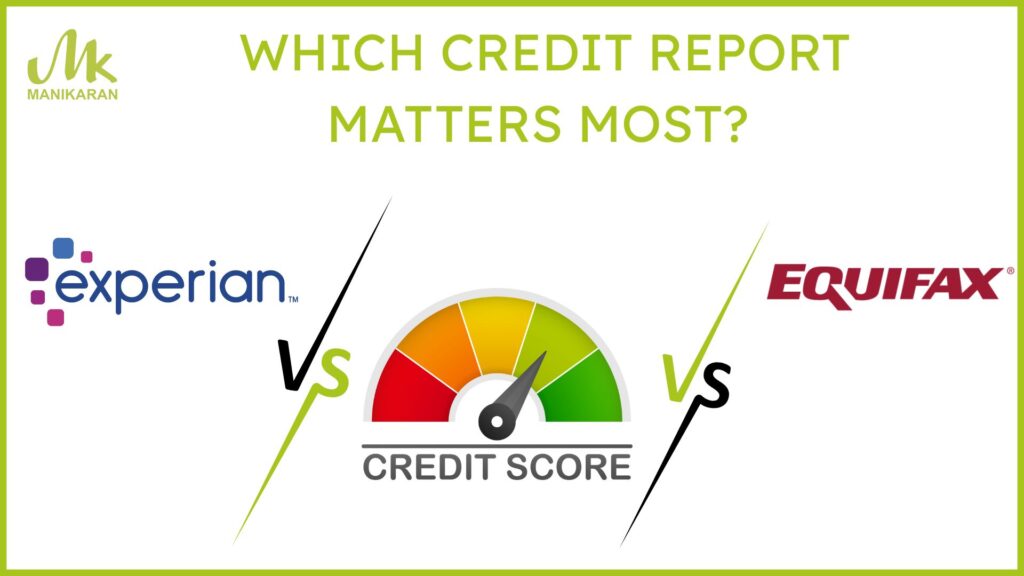Introduction
Whenever one applies for a personal loan, credit card, or home loan, lenders take into consideration not just your income but also your credit history. Your credit history is maintained by credit bureaus, organizations tracking how well you have managed borrowed money in the past. In India, there are three main credit bureaus: CIBIL, Experian, and Equifax.
Each one collects your financial data, analyzes your repayment behavior, and generates a credit score, a three-digit number that determines your creditworthiness. But here’s one common confusion-if there are three bureaus, which credit report actually matters most?
Let’s understand how these agencies work, what sets them apart, and which one plays the biggest role when you apply for a loan.
What is a Credit Report, and Why Does it Matter?
A credit report is like a financial mirror reflecting your credit behavior. It includes your loan accounts, usage of credit cards, history of repayments, and even the number of times you have applied for credit.
This report helps lenders answer one critical question: Can this person repay on time?
Your credit score, normally ranging from 300 to 900, is based on the information in your credit report. The higher the score, the more reliable you appear as a borrower.
Here’s why your credit report is so important:
Loan Approvals: A good credit report leads to quick approvals.
Interest rates: Lenders offer loans with lower interest rates to good credit borrowers.
Credit limit: The better your score, the higher your credit card limit can be.
Financial reputation: Your credit report acts like a résumé for banks and NBFCs.
The Three Major Credit Bureaus in India
There are four credit information companies in India:
TransUnion CIBIL
Experian India
Equifax India
CRIF High Mark
Of these, the most recognized are CIBIL, Experian, and Equifax. Each one uses its own methods and data sources, so your actual score could be slightly different in each.
Let’s dive into each bureau to understand how they work.
1. CIBIL (TransUnion CIBIL)
Founded in 2000, CIBIL or Credit Information Bureau India Limited was India’s first and most widely used credit bureau. Later, it collaborated with TransUnion, a global credit information company, and since then, it operates as TransUnion CIBIL.
Key Features
Score range: 300–900
Good score: 750 and above
Data sources: Banks, NBFCs, credit card issuers
Coverage: Individual and commercial borrowers
Free report: Available once a year on www.cibil.com
Why CIBIL Matters
Over time, CIBIL has become the default choice for most Indian banks. So, whenever you apply for a loan, the system of the lender automatically runs a CIBIL check.
Since CIBIL started its database more than two decades ago, it contains the largest consumer data, making its reports highly reliable.
If your CIBIL score is less than 700, you may get loan approvals but at a higher interest rate. A score above 750+ is considered as good financial discipline by the lenders.
2. Experian India
Experian is an Irish multinational consumer credit reporting company headquartered in Ireland and was approved by the Reserve Bank of India in 2010. It has a strong presence in more than 40 countries around the world, providing credit information, analytics, and fraud protection services.
Key Features
Score range: 300–900
Good score: 750+
Focus Areas: Retail loans, credit cards, and fintech-based lending
Free report: Available once every year from www.experian.in
Why Experian Matters
Experian is particularly strong in digital lending and fintech partnerships. Many instant loan apps, digital NBFCs, and online credit card platforms use Experian data for quick borrower evaluation.
Experian’s analytics-driven model focuses on behavioral patterns, meaning that it studies how one uses and pays back credit; thus, it is very effective in assessing new-to-credit customers who don’t have long credit histories.
Unique Selling Proposition
Experian reports changes in your loan or card details faster. If you are an active digital borrower, using online loans, it may reflect your most current credit position more accurately than others.
3. Equifax India
Equifax India began operations in 2010 and was established as a joint venture with Equifax Inc. – one of the oldest credit bureaus in the U.S. Unlike CIBIL and Experian, which focus mainly on individual borrowers, Equifax also specializes in SME and business credit data.
Key Features
Score range: 300–850
Good score: above 700
Focus areas: Retail loans, MSME loans, business profiles
Free report: Once per year at www.equifax.co.in
Why Equifax Matters
Equifax provides analytics that are far beyond the simple loan repayment history, including:
Debt-to-income ratios
Repayment trends
Business borrowing summaries
Many corporate lenders, NBFCs, and microfinance institutions depend upon Equifax for credit risk assessment.
Unique Benefit
Equifax offers value if you run a small business or startup and have both personal and business credit accounts. Their reports give a more in-depth look for business owners.
Comparison: CIBIL vs. Experian vs. Equifax
Feature CIBIL Experian Equifax
Founded 2000 2010 2010
Score Range 300–900 300–900 300–850
Ideal Score\t750+\t750+\t700+
Coverage\tIndia-wide\tGlobal\tGlobal
Focus Retail loans Fintech & digital credit Business & NBFCs
Preferred By Banks & NBFCs Fintech lenders Corporates
Free Report 1 per year 1 per year 1 per year
Turnaround Time\tModerate\tFast\tModerate
Online Portal CIBIL.com Experian.in Equifax.co.in
Why Your Scores Are Different at Each Bureau
You might notice that your credit scores vary between CIBIL, Experian, and Equifax. For example:
CIBIL: 780
Experian: 765
Equifax: 740
This difference happens because:
Different data sources: some lenders may be quicker to share information with one bureau over another.
Unique Algorithms: Each company has its own scoring model and weightage.
Update Frequency: Some bureaus refresh data more often.
Data Errors or Omissions: A lender may have incorrectly reported data to one bureau.
The good news? Lenders don’t depend on just one score. Most at least check one or two reports for consistency before approving a loan.
Which Credit Report Do Lenders Check Most Often?
In India, CIBIL enjoys the position of being the most trusted credit bureau by almost all traditional banks, including SBI, HDFC, Axis Bank, and ICICI. All these institutions almost always check your CIBIL score whenever you apply for a personal loan, car loan, or mortgage.
However, many NBFCs and fintech platforms, particularly the ones offering instant digital loans, use Experian and Equifax, too.
Here’s a quick breakdown:
CIBIL: The traditional banking sector is clearly dominated by CIBIL.
Experian: preferred among digital lenders and credit card companies.
Equifax: Used by NBFCs and small business lenders.
Which Credit Report Matters the Most?
Though all three bureaus provide credible reports, CIBIL remains most influential among Indian borrowers. Here’s why:
It has the longest history and the most extensive data.
It is used by most Indian banks.
It has wider acceptance for loan and credit card processing.
However, it is not wise to ignore Experian or Equifax, because each report plays a role depending on where you apply for credit.
Rather than asking which one matters most, a better approach is to keep all three reports in good shape.
How to Keep a Good Credit Score at All Reporting Bureaus
This will naturally help your score in the other bureaus, too, since they all use similar factors.
Follow these proven tips:
1. Pay Your Bills on Time
Your payment history is the most important factor. A single missed EMI can reduce your score by as much as 50–100 points.
2. Keep Credit Utilization Low
Try not to use more than 30% of your credit limit. If it is ₹1,00,000, then use only up to ₹30,000 per month.
3. Avoid Frequent Loan Applications
Each inquiry into a loan reduces your score temporarily. Multiple applications within a short period project credit hunger, which lenders do not like.
4. Keep Old Accounts
Do not close credit cards unnecessarily; the length of credit history contributes to a better score.
5. Regularly Check Reports
Go to each bureau’s website and download a free report every 12 months. If you see mistakes, such as loans you never took out, dispute them immediately.
6. Keep a Mix of Credit Types
A balanced portfolio of secured loans-home, car-and unsecured loans-personal, credit card-reflects that you can handle diverse credit responsibly.
What to Do If Your Score Is Low
If your CIBIL, Experian, or Equifax score is below 700, here’s how you can rebuild it:
Pay the overdue EMIs immediately.
Negotiate settlements and make sure they are marked as “closed” in reports.
Rebuild history by taking a small personal loan and repaying it on time.
Avoid joint loans whenever possible. Defaults by co-borrowers can hurt your score.
Monitor credit card statements monthly and report any discrepancy promptly.
The Future of Credit Scoring in India
Credit evaluation is becoming more sophisticated with the rise of digital lending.
New-age fintechs have started leveraging AI-based models, which factor in traditional scores-like CIBIL-along with alternative data, such as:
Utility bill payments
Mobile recharge history
Rent payments
UPI transactions
While traditional credit bureaus like CIBIL, Experian, and Equifax will continue to dominate, these newer models make credit more accessible to first-time borrowers and gig workers.
Conclusion
So, which credit report matters most — CIBIL, Experian, or Equifax?
The correct answer is: All three matter, but CIBIL leads the way.
While CIBIL is the most recognized by Indian banks, Experian is fast growing in the digital space, and Equifax remains vital in business lending. Together, they shape your financial reputation.
Good credit health is maintained when
Check your reports regularly.
Keep your usage low.
Pay every EMI on time.
Avoid multiple applications for loans.
A good credit score brings with it faster approvals, lower interest rates, and more financial freedom—exactly what Manikaran Credit can help you achieve. SEO Optimization Details Focus Keyphrase: CIBIL vs Experian vs Equifax Secondary Keywords: which credit report matters most, credit score India, CIBIL score vs Experian, Equifax credit report, loan approval credit score Slug: cibil-vs-experian-vs-equifax-credit-report Meta Title: CIBIL vs. Experian vs. Equifax — Which Credit Report Matters Most in India? Meta Description: “Confused between CIBIL, Experian, and Equifax? Understand how these credit bureaus differ, which one matters most for loan approvals, and how to maintain a good credit score in India.



